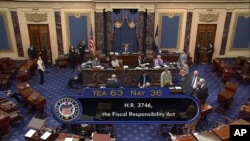The US Senate voted Thursday night 63-36 in favor of a measure that would allow the country to avoid a default on its debts. The United States had been on track to run out of cash in four days. The bipartisan legislation now goes to President Joe Biden for his signature.
“Tonight, Senators from both parties voted to protect our hard-won economic progress and prevent America’s first default,” Biden said in a statement.
The House of Representatives voted overwhelmingly Wednesday night, with broad support from Republican and Democratic lawmakers alike, to allow the government to continue borrowing more money over the next year and a half to meet its financial obligations, exceeding the limit of current debt of 31.4 trillion dollars.
The legislation does not establish a new currency ceiling, but the borrowing authority would extend until January 2, 2025, two months after next year’s presidential election.
In addition, the legislation requires keeping most federal spending at current levels in the fiscal year beginning in October, with a 1% increase over the next 12 months.
“The responsibility of the United States is to pass it,” a Senate leader, Democrat Dick Durbin, told reporters.
Both Democratic Senate Majority Leader Chuck Schumer and Senate Republican Leader Mitch McConnell supported suspending the debt limit and called for speedy passage of the legislation.
Schumer told the Senate: “Time is a luxury the Senate does not have if we are to avoid default. There is no good reason, none at all, to take this process to the end. … I hope we don’t see anything approaching brinkmanship. The country cannot afford that now.”
The House approved the legislation by a vote of 314-117 despite objections from far-right Republican lawmakers who said it did not go far enough to cut spending and progressive Democrats who said it cut too much.
Seventy-one lawmakers from the majority Republican party in the House voted against the bill, as did 46 Democrats.
In a statement following Wednesday’s vote, Biden hailed the deal as a “bipartisan compromise.”
“It protects the key priorities and accomplishments of the last two years, including the historic investments that are creating good jobs across the country,” Biden said. “And it honors my commitment to safeguard Americans’ health care and protect Social Security, Medicare and Medicaid. [pensiones y seguro de atención médica para estadounidenses mayores y pagos de asistencia social para personas empobrecidas]. It protects critical programs that millions of working families, students, and veterans count on.”
House Speaker Kevin McCarthy, a Republican who brokered the deal with Biden, told reporters that passing the bill “was not an easy fight.” He stressed budget savings and criticized Democrats who wanted to separate the debate on future public spending from the need to suspend the debt limit in order to meet current financial obligations.
“We put the citizens of the United States first and we didn’t do it by taking the easy way out,” McCarthy said. “We didn’t do it the way people did in the past by just lifting [el techo de la deuda]. We decided you had to spend less and we achieved that goal.”
McCarthy said he intends to follow Wednesday’s action with more efforts to cut federal spending.
The measure does not raise taxes, nor will it prevent the total national debt from continuing to rise, perhaps by another $3 trillion or more over the next year and a half until the next debt limit expires.
Other pieces of legislation include a reduction in the number of new agents hired by the nation’s tax collection agency, a requirement requiring states to return $30 billion in unspent coronavirus pandemic assistance to the federal government, and that the upper age group for those forced to work to receive food aid be extended from 50 to 54 years.
Connect with the Voice of America! Subscribe to our channel Youtube and activate notifications, or follow us on social networks: Facebook, Twitter and Instagram.















